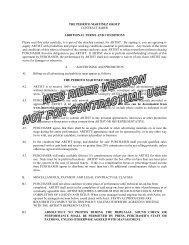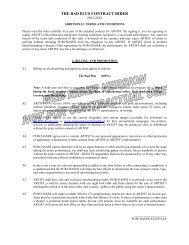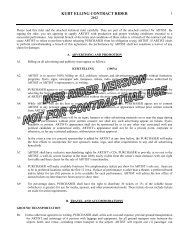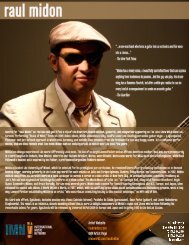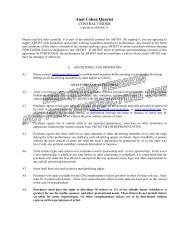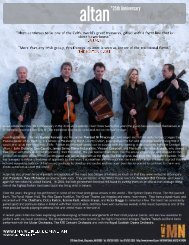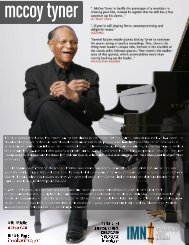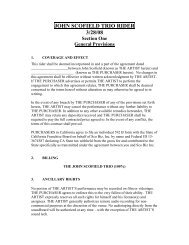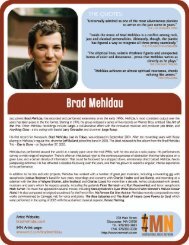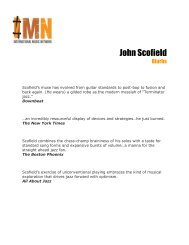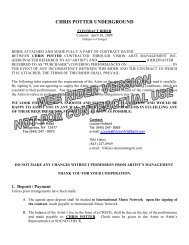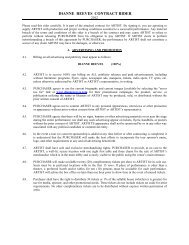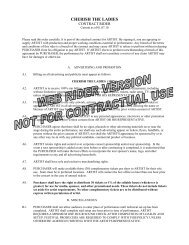Create successful ePaper yourself
Turn your PDF publications into a flip-book with our unique Google optimized e-Paper software.
JOHN SCOFIELD<br />
Biography<br />
2007-2008<br />
Born in Ohio and raised in suburban Connecticut, <strong>Scofield</strong> took up the guitar at age 11,<br />
inspired by both rock and blues players. A local teacher introduced him to Wes Montgomery,<br />
Jim Hall and Pat Martino, which sparked a lifelong love of jazz. Sco soon attended the Berklee<br />
College of Music, later moving into the public eye with a wide variety of bandleaders and<br />
musicians including Charles Mingus, Herbie Hancock, Chick Corea, Joe Henderson, Billy<br />
Cobham/George Duke, Gerry Mulligan, McCoy Tyner, Jim Hall, and Gary Burton. In 1982, he<br />
began a three-and-a-half-year stint touring with Miles Davis. <strong>Scofield</strong>’s compositions and<br />
inimitable guitar work appear on three of Davis’ albums.<br />
<strong>Scofield</strong> began recording as a leader in the late 1970s, establishing himself as an influential<br />
and innovative player and composer. His recordings-many already classics-include<br />
collaborations with contemporary favorites like Pat Metheny, Medeski, Martin & Wood, Bill<br />
Frisell, Government Mule, and Joe Lovano. Through it all, the guitarist has kept an open<br />
musical mind.<br />
Signing with Verve Records in 1995, <strong>Scofield</strong> released Quiet in 1996, A Go Go in 1997, Bump<br />
in 1999, and Works For Me in 2000. With the help of bandmates Avi Bortnick (guitar), Jesse<br />
Murphy (bass), and Adam Deitch (drums), Sco adds überjam to his varied discography.<br />
Autobiography by <strong>John</strong> <strong>Scofield</strong><br />
How I Got From There to Here in 704 Easy Words<br />
When I first got into jazz -- around 1969, I came from playing R&B and Soul in High School.<br />
Jazz Rock was in its infancy stage and I was lucky enough to be around to experience the<br />
Golden Age of both Rock and Soul and see Jazz embrace that movement while I was trying to<br />
learn how to play straightahead Jazz. A lot of my early chances to actually gig were in various<br />
Jazz/Rock idioms. I got to play "real" jazz with Gary Burton and Gerry Mulligan but my real<br />
first "big time" gig was with the Billy Cobham/George Duke band. We got to play in gigantic<br />
concert halls and rock venues for excited people who were not necessarily jazz aficionados,<br />
but loved the music.<br />
After that band ended, I stayed home in NYC and worked on playing acoustic jazz with my<br />
own groups and people like Dave Liebman. I also started an ongoing musical relationship with<br />
bassist Steve Swallow that continues to this day. As a jazz bassist and real songwriter (not<br />
just a composer) Swallow has influenced me as much as anyone.<br />
In 1982, I joined the Miles Davis Band, answering the call of funky jazz once again. My stint<br />
with Miles made me sure that there really was a kind of music that was both funky and<br />
improvised at the same time.<br />
After playing with Miles for over three years and making a few more records of my own, I<br />
hooked up with ex-P-Funk drummer Dennis Chambers, and we made a group that really<br />
utilized funk rhythms. Dennis and bassist Gary Grainger were masters of that "James Brown/<br />
Earth Wind and Fire/ 70's thing". It was great having that underneath my tunes.<br />
When I signed with Blue Note Records in 1989, I decided to explore more "swinging" avenues.<br />
I got together with my old Berklee School buddy, genius saxophonist Joe Lovano. We had a<br />
group and made three albums for Blue Note -- four counting a bootleg from Europe -- that are<br />
probably my very best "jazz" endeavors. Part of that can also be attributed to the magnificent<br />
drumming of Bill Stewart, who is as good a musician as I've ever met.
Then I felt the urge to get into a soul-jazz thing. I'd been really influenced by the music of<br />
Eddie Harris and Les McCann from the sixties. I invited Eddie to guest on the album Hand Jive.<br />
This was about the same time that Larry Goldings entered my music on Hammond Organ.<br />
With the collective possibilities of these musicians, I began to allow jazz to blend with New<br />
Orleans type rhythms to make the music groove.<br />
Around this period, I also worked and recorded some with Pat Metheny -- one of the great<br />
guitarists. He and Bill Frisell are my favorite guitar players to play with and listen to. But then<br />
there's also Jim Hall and Mike Stern and Jim Hall and <strong>John</strong> Abercrombie and Jim Hall and Kurt<br />
Rosenwinckle and Jim Hall and Peter Bernstein... not to mention Jim Hall. And then there's<br />
also Albert King and Carlos Santana and Tom Morello and all the other ones I can't summon<br />
the names of right at the moment.<br />
When I heard Medeski, Martin and Wood's record "Shack Man", I knew I had to play with<br />
them. They played those swampy grooves and had a free jazz attitude. These guys are serious<br />
conceptualists and are able to take the music to beautiful and strange places. I love what they<br />
did on AGoGo. In the last couple of years, I've heard some great young players that remind<br />
me often of what it is that I like so much about the music of sixties R&B.<br />
Now I'm able to take that music and mix it with jazz all over again. I'm having more fun<br />
playing now than I ever have and I feel like I can finally really learn to play the guitar. Now,<br />
after having the chance to play with many of my musical idols -- I'm getting inspiration from<br />
younger musicians. I'm as excited about writing and playing music as I ever have been.
NPR Music: <strong>John</strong> <strong>Scofield</strong>: Funk Finds Its Swing<br />
http://www.npr.org/templates/story/story.phpstoryId=16355507&sc=emaf<br />
Page 1 of 2<br />
11/20/2007<br />
<strong>John</strong> <strong>Scofield</strong>: Funk Finds Its Swing<br />
Listen Now [13 min 25 sec]<br />
Add to Playlist<br />
<strong>John</strong> <strong>Scofield</strong>'s new album features jazz<br />
covers of famous rock tunes, like<br />
"House of the Rising Sun" and "(I Can't<br />
Get No) Satisfaction."<br />
SCOFIELD'S SONGS<br />
Following his interview with NPR,<br />
<strong>John</strong> <strong>Scofield</strong> performed a solo<br />
version of a song from his new<br />
album:<br />
'BEHIND CLOSED DOORS'<br />
ADD TO PLAYLIST<br />
Songs from This Meets That:<br />
'HECK OF A JOB'<br />
ADD TO PLAYLIST<br />
'SATISFACTION' (ROLLING<br />
STONES COVER)<br />
ADD TO PLAYLIST<br />
"When I write a tune -- and it's been<br />
like this for many years -- I always<br />
hear in the back of my head some<br />
sort of vague, orchestrated, fully<br />
fleshed-out big-band version of the<br />
Nick Suttle<br />
Weekend Edition Sunday, November 18, 2007 -<br />
Nowadays, guitarist <strong>John</strong> <strong>Scofield</strong> is largely known for<br />
his funky side. He's worked on the fringes of jazz-rock<br />
and released discs incorporating the dense grooves<br />
of Medeski, Martin & Wood, as well as members of<br />
Sex Mob and Soul Coughing. A recent <strong>Scofield</strong> album<br />
paid tribute to soul man Ray Charles.<br />
But <strong>Scofield</strong> developed his chops by playing with the<br />
likes of Miles Davis, Chet Baker, Gerry Mulligan and<br />
Charles Mingus. His new CD, This Meets That, finds<br />
<strong>Scofield</strong> largely back in his swing element. It features<br />
the other members of what he calls his "A-Team" trio<br />
— bassist Steve Swallow and drummer Bill Stewart —<br />
plus a hard-blowing four-piece horn section.<br />
"We covered some kind of rock tunes," <strong>Scofield</strong> says,<br />
"and there are other tunes that are kind of funky. But I<br />
think the swing feel wins out for the majority of the<br />
music."<br />
<strong>John</strong> <strong>Scofield</strong> spoke with Liane Hansen about his new<br />
album, and brought out his guitar for a special solo<br />
performance.<br />
On This Meets That, <strong>Scofield</strong> used the opportunity to<br />
bring to life some songs which aren't particularly<br />
associated with jazz — for example, "House of the<br />
Rising Sun," popularized by The Animals.<br />
"It's one of these anthems that everybody learns<br />
when they're learning to play the guitar, and I did in<br />
1960-whatever when it came out," <strong>Scofield</strong> says. "It<br />
turns out kids today still learn that four-chord<br />
progression when they're just picking up the guitar."<br />
Guitarist Bill Frisell makes a guest appearance on the<br />
song, despite his initial apprehension. "We were<br />
talking about that as we recorded it, 'cause I said I<br />
wanted to do this, and he says, 'Oh, you've got to be<br />
kidding,'" <strong>Scofield</strong> says. "And then we both realized,<br />
you know, that it was almost the first song either of us<br />
had ever learned."
NPR Music: <strong>John</strong> <strong>Scofield</strong>: Funk Finds Its Swing<br />
http://www.npr.org/templates/story/story.phpstoryId=16355507&sc=emaf<br />
Page 2 of 2<br />
11/20/2007<br />
song with other parts going on."<br />
<strong>John</strong> <strong>Scofield</strong><br />
<strong>Scofield</strong> also used the record to expand the size of his ensemble,<br />
something he says he's always wanted to do.<br />
"When I write a tune — and it's been like this for many years — I<br />
always hear in the back of my head some sort of vague, orchestrated, fully fleshed-out big-band<br />
version of the song with other parts going on," <strong>Scofield</strong> says. "And I never really get to get to that<br />
really often because I'm usually playing with trios and quartets on the road, you know, for economic<br />
reasons, too."<br />
Not that <strong>Scofield</strong> abandons the highly groove-oriented jams which have won him acclaim in recent<br />
years. He dedicates one tune called "Heck of a Job" to the New Orleans funk band The Meters, a<br />
group which led him to see the entire diaspora of New Orleans music.<br />
"The Meters are, I think, the most influential group in our time to come out of New Orleans, to have<br />
changed and introduced us all to a way of playing, and to a groove and a level of feel in playing funkjazz,"<br />
<strong>Scofield</strong> says.<br />
<strong>Scofield</strong> left NPR with a solo performance of "Behind Closed Doors," a tune written by country artist<br />
Charlie Rich. Though the music of Rich doesn't enter most jazz fans' minds, <strong>Scofield</strong> says that he<br />
draws inspiration from the vocal phrasing of older country music in his improvisation.<br />
"Everybody thinks country is this, soul music is this, jazz is this, folk music is this, and they all take on<br />
these social groups and whatever," he says. "But I just always loved that song, and I always loved<br />
roots-country music — people like Charlie Rich."<br />
Related NPR Stories<br />
Nov. 2, 2006<br />
Four Jazz Names Are More Fun Than One<br />
Jul. 21, 2005<br />
<strong>Scofield</strong> Plays Ray Charles: 'That's What I Say'<br />
Jun. 18, 2005<br />
A Jazz Guitarist Interprets Ray Charles Classics<br />
Jun. 5, 2005<br />
A Brief Tour of Summer Music Festivals<br />
Feb. 27, 2002<br />
<strong>John</strong> <strong>Scofield</strong>'s 'Uberjam'
Review Courtesy AllAboutJazz.com<br />
This Meets That<br />
<strong>John</strong> <strong>Scofield</strong> | Emarcy/Universal<br />
By <strong>John</strong> Kelman<br />
It was inevitable. Guitarist <strong>John</strong> <strong>Scofield</strong> has, for<br />
the past decade, alternated regularly between<br />
albums aimed at the groove-centric (and<br />
broader) demographic he first captured with A<br />
Go Go (Verve, 1998) and discs appealing to a<br />
more committed jazz audience. <strong>Scofield</strong> has<br />
always represented a unique combination of<br />
advanced harmony, allowing him to seamlessly migrate between playing<br />
“in” and “out,” visceral funk and blues concerns. The “This” and “That”<br />
music, referred to in the title This Meets That, is even more broad-reaching<br />
than usual, but <strong>Scofield</strong> has finally assimilated his multiplicity of musical<br />
interests, making this one of the best records of his career.<br />
It’s the same core trio from EnRoute (Verve, 2004)--bassist Steve Swallow<br />
and drummer Bill Stewart--but it couldn’t sound more different. With the<br />
addition of a four-piece horn section and material ranging from swing to<br />
funk and free territory to country (with a bit of altered rock and roll<br />
thrown in), <strong>Scofield</strong> has never sounded more divergent yet, curiously,<br />
more himself. Swallow and Stewart have always been known for their<br />
individual musical breadth and abilities to combine firm pulse and<br />
telepathic interaction with whomever they’re playing, but here, they make<br />
as perfect a team with <strong>Scofield</strong> as can be imagined.<br />
<strong>Scofield</strong>’s tone ranges from the clean warmth that dominated most of<br />
EnRoute to the grittier tone of albums like That’s What I Say (Verve, 2005).<br />
And while it doesn’t overwhelm the disc, some of the processing that he<br />
began using with his Uberjam band on albums including Up All Night<br />
(Verve, 2003) can be heard as well, most notably on his solo intro to the<br />
Celtic/Americana-infused “Down D.” He applies a little wah-wah<br />
envelope filter to the funky Second Line tinged “Heck of a Job ” where
the horns both broaden harmonically and punctuate.<br />
<strong>Scofield</strong> has scored for horns before, but on the comfortably swinging<br />
“Strangeness in the Night” the four horns sound more like a big band,<br />
while taking “Down D” to harmonic territory that can only be described<br />
as “Sco.” A trio version of the country classic “Behind Closed Doors,”<br />
plays it straight at the outset, but <strong>Scofield</strong> ultimately makes it his own<br />
with a lyrical, behind-the-beat solo.<br />
<strong>Scofield</strong> revisits “Pretty Out,” from his collaboration with Bill Frisell,<br />
Grace Under Pressure (Blue Note, 1992), but this time it’s even farther out,<br />
with a free-time middle section featuring open-ended solos by both Sco<br />
and Stewart. Frisell returns for a guest appearance on an up-tempo<br />
remake of the classic “House of the Rising Sun,” avoiding shtick with a<br />
new bridge section and significant reharmonization that’s reverent yet<br />
distinctive.<br />
<strong>Scofield</strong> comes closer to that shtick with his rocking version of The<br />
Rolling Stones' “I Can’t Get No Satisfaction,” but just when it seems that<br />
there’s little to be done, he injects some beautiful close-voicings on guitar<br />
that are matched in slight dissonance by the horns, making it a perfect<br />
closer to an album where, indeed, This Meets That.<br />
Track Listing: The Low Road; Down D; Strangeness in the Night;<br />
Heck of a Job; Behind Closed Doors; House of the Rising Sun; Shoe<br />
Dog; Memorette; Trio Blues; Pretty Out; I Can’t Get No Satisfaction.<br />
Personnel: <strong>John</strong> <strong>Scofield</strong>: guitar; Steve Swallow: bass; Bill Stewart:<br />
drums; Roger Rosenberg: baritone saxophone, bass clarinet; Lawrence<br />
Feldman: tenor saxophone, flutes; Jim Pugh: trombone; <strong>John</strong> Swana:<br />
trumpet, flugelhorn; Bill Frisell: tremolo guitar (6).<br />
CD Review Center | Upcoming Release Center



